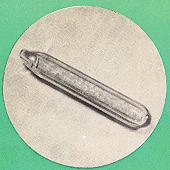Actinium(III) oxide
Appearance

| |

| |
| Names | |
|---|---|
| IUPAC name
Actinium(III) oxide
| |
| Systematic IUPAC name
Actinium(3+) oxide | |
| Other names
Actinium sesquioxide
| |
| Identifiers | |
3D model (JSmol)
|
|
| ECHA InfoCard | 100.031.275 |
| EC Number |
|
PubChem CID
|
|
CompTox Dashboard (EPA)
|
|
| |
| Properties | |
| Ac2O3 | |
| Molar mass | 502.053 g/mol |
| Appearance | white |
| Melting point | 2,327 °C (4,221 °F; 2,600 K)[1] |
| Structure | |
| Trigonal, hP5 | |
| P3m1, No. 164 | |
a = 408 pm, c = 630 pm[1]
| |
| Related compounds | |
Other cations
|
Lanthanum(III) oxide |
Except where otherwise noted, data are given for materials in their standard state (at 25 °C [77 °F], 100 kPa).
| |
Actinium(III) oxide is a chemical compound containing the rare radioactive element actinium. It has the formula Ac2O3. It is similar to its corresponding lanthanum compound, lanthanum(III) oxide, and contains actinium in the oxidation state +3.[2][3] Actinium oxide is not to be confused with Ac2O (acetic anhydride), where Ac is an abbreviation for acetyl instead of the symbol of the element actinium.
Reactions
[edit]- Ac2O3 + 6HF → 2AcF3 + 3H2O
- Ac2O3 + 6HCl → 2AcCl3 + 3H2O
- 4Ac(NO3)3 → 2Ac2O3 + 12NO2 + 3O2
- 4Ac + 3O2 → 2Ac2O3
- Ac2O3 + 2AlBr3 → 2AcBr3 + Al2O3
- 2Ac(OH)3 → Ac2O3 + 3H2O
- Ac2(C2O4)3 → Ac2O3 + 3CO2 + 3CO
- Ac2O3 + 3H2S → Ac2S3 + 3H2O
References
[edit]- ^ a b Christine Guéneau; Alain Chartier; Paul Fossati; Laurent Van Brutzel; Philippe Martin (2020). "Thermodynamic and Thermophysical Properties of the Actinide Oxides". Comprehensive Nuclear Materials 2nd Ed. 7: 111–154. doi:10.1016/B978-0-12-803581-8.11786-2. ISBN 9780081028667. S2CID 261051636.
- ^ Actinium, Great Soviet Encyclopedia (in Russian)
- ^ Sherman, Fried; Hagemann, French; Zachariasen, W. H. (1950). "The Preparation and Identification of Some Pure Actinium Compounds". Journal of the American Chemical Society. 72 (2): 771–775. doi:10.1021/ja01158a034.
